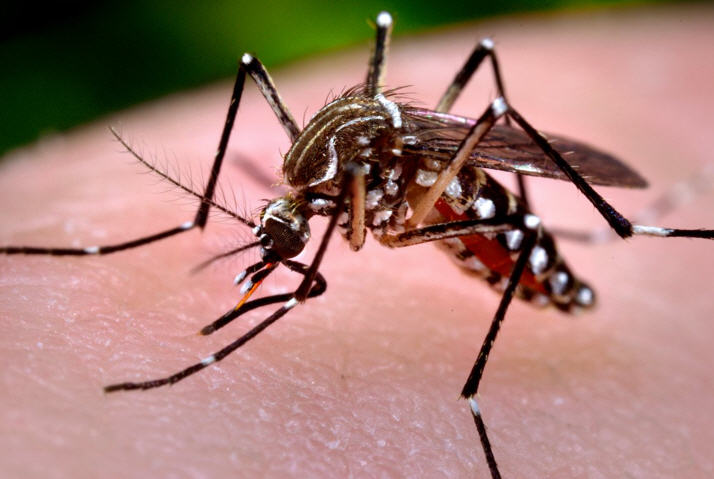
Meet Aedes aegypti, the new unwanted guest in your garden.
Facts:
1. The Aedes aegypti mosquito (photo), which carries the Zika virus, also transmits dengue, yellow fever and chikungunya. It lives only a few weeks, and doesn’t stray more than 100 yards from where it was hatched.
2. The Aedes mosquito is not the same as the Culex mosquito, which carries West Nile.
3. Aedes mosquitoes bite during the day and like all mosquitoes, can breed in less than a teaspoonful of water.
4. The Zika-bearing Aedes is an invasive species, native to tropical and subtropical areas, common in the U.S. in Florida, along the Gulf Coast, and in Hawaii. It is smart and adaptable.
5. The key to controlling the spread of mosquito-borne diseases is to inhibit population growth using localized repellants and reducing places mosquitoes breed.
Preventive measures:
1. Remove all standing water and potential breeding areas.
2. Keep gutters clean and drainage downspouts unclogged.
3. Reroute downspouts or add extensions to carry water away from standing areas.
4. Keep swimming pools cleaned and treated, even when not in use.
5. Walk your property after a rain. If areas aren’t draining well, or there are puddles, re-grade to redirect water and enable evaporation.
6. Aerate ornamental ponds to keep water moving.
7. Stock ponds with mosquito-eating fish.
8. Eliminate any open container in the garden that holds water after a rain.
9. Remove pet water containers, empty saucers under flowerpots and pottery.
10. Control irrigation systems to eliminate wasted water or pooling runoff.
Treatments & Approaches:
Control starts in your own backyard but it’s important for the entire neighborhood to take mosquito control seriously.
Our Products:
Lambert’s uses natural, non-chemical agents and remedies for all its pest control programs, including mosquito mitigation. We believe chemical insecticides and chemical agents are toxic and therefore harmful to people, pets, wildlife, air quality, plant systems, beneficial insects and pollinators.
Our Practice:
We rotate our products to keep the mosquitoes from developing a resistance. The materials we use are safe and derived from all-natural sources.
Weekly spraying combined with the IPM – integrated pest management – approach of using safe larvicides, removing all mosquito breeding-hiding areas, and using permanent or temporary repellant misting systems has proven to be most effective.
Additionally, we employ a number of smart yard management techniques that include certain garden plants that naturally repel mosquitos.
How can I get your service?
Lambert’s mosquito and pest program is an enhancement to our standard organic fertilization service provided to all annual maintenance clients or to any homeowner interested in a non-toxic approach.
Treatment timing:
March-April.
Who can I call for more information?
Contact your Garden Services Manager or Lambert’s Senior Technical Advisor, Dan Morgan, 214-350-8350; dmorgan@lamberts.net









